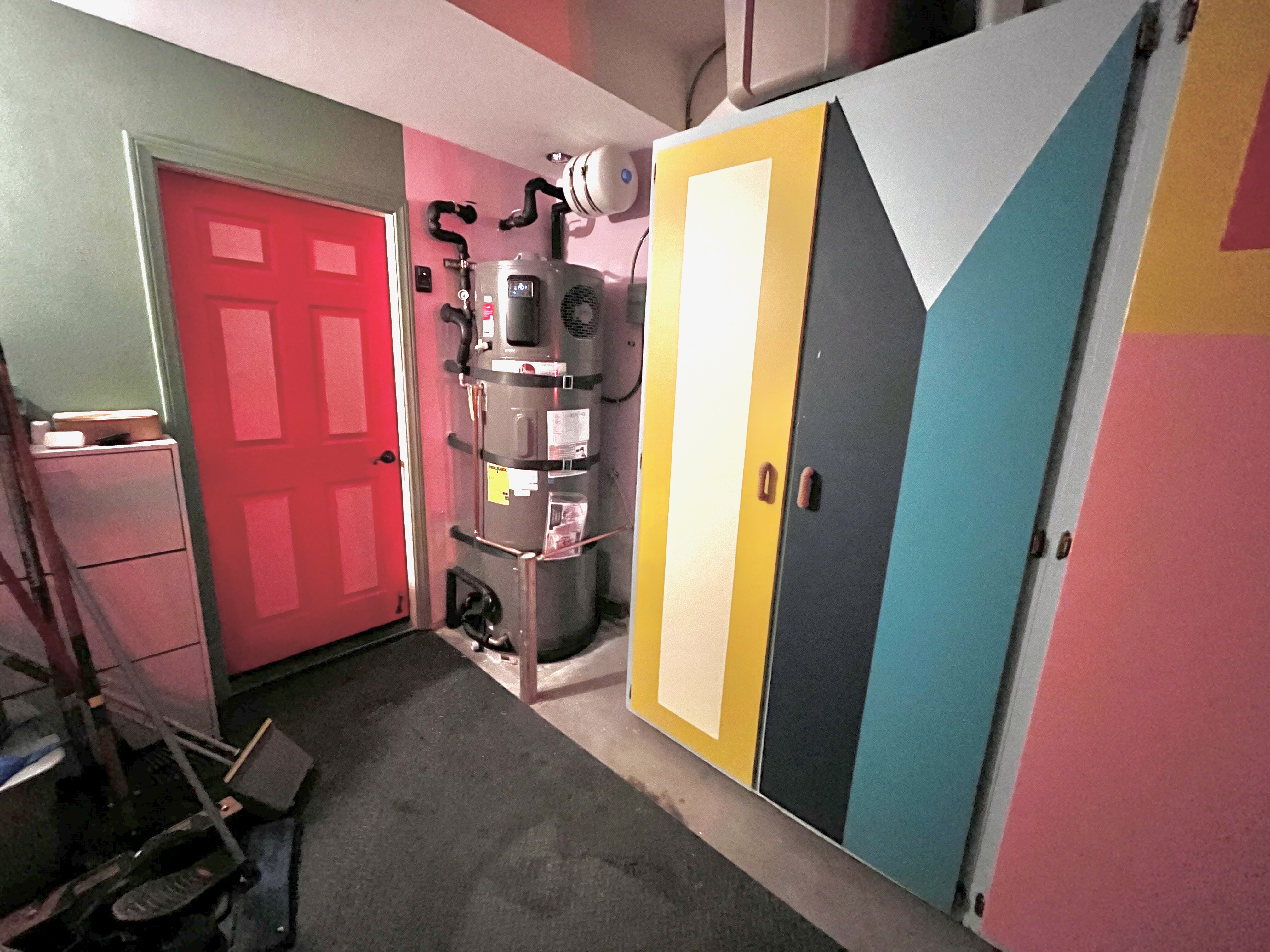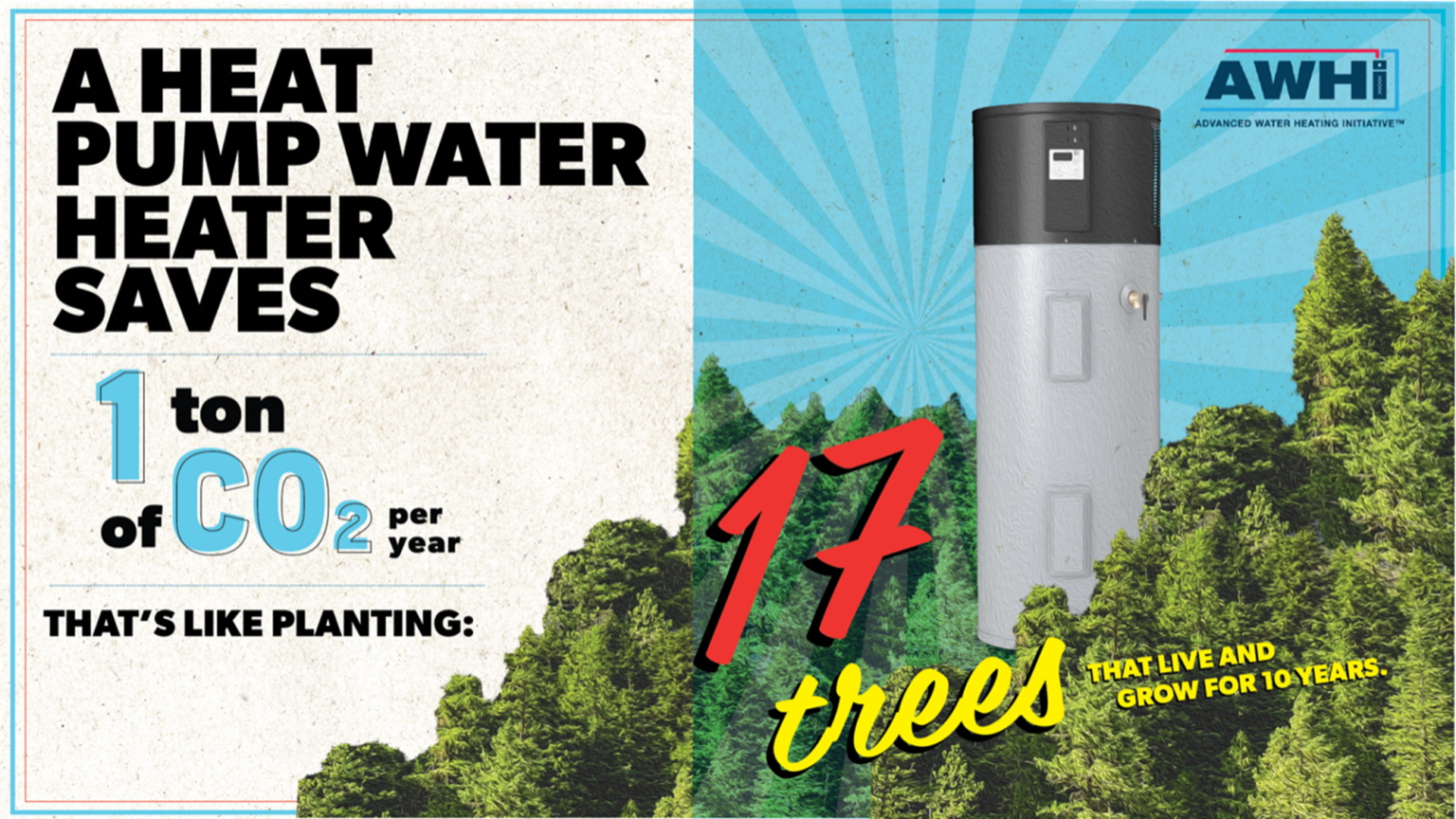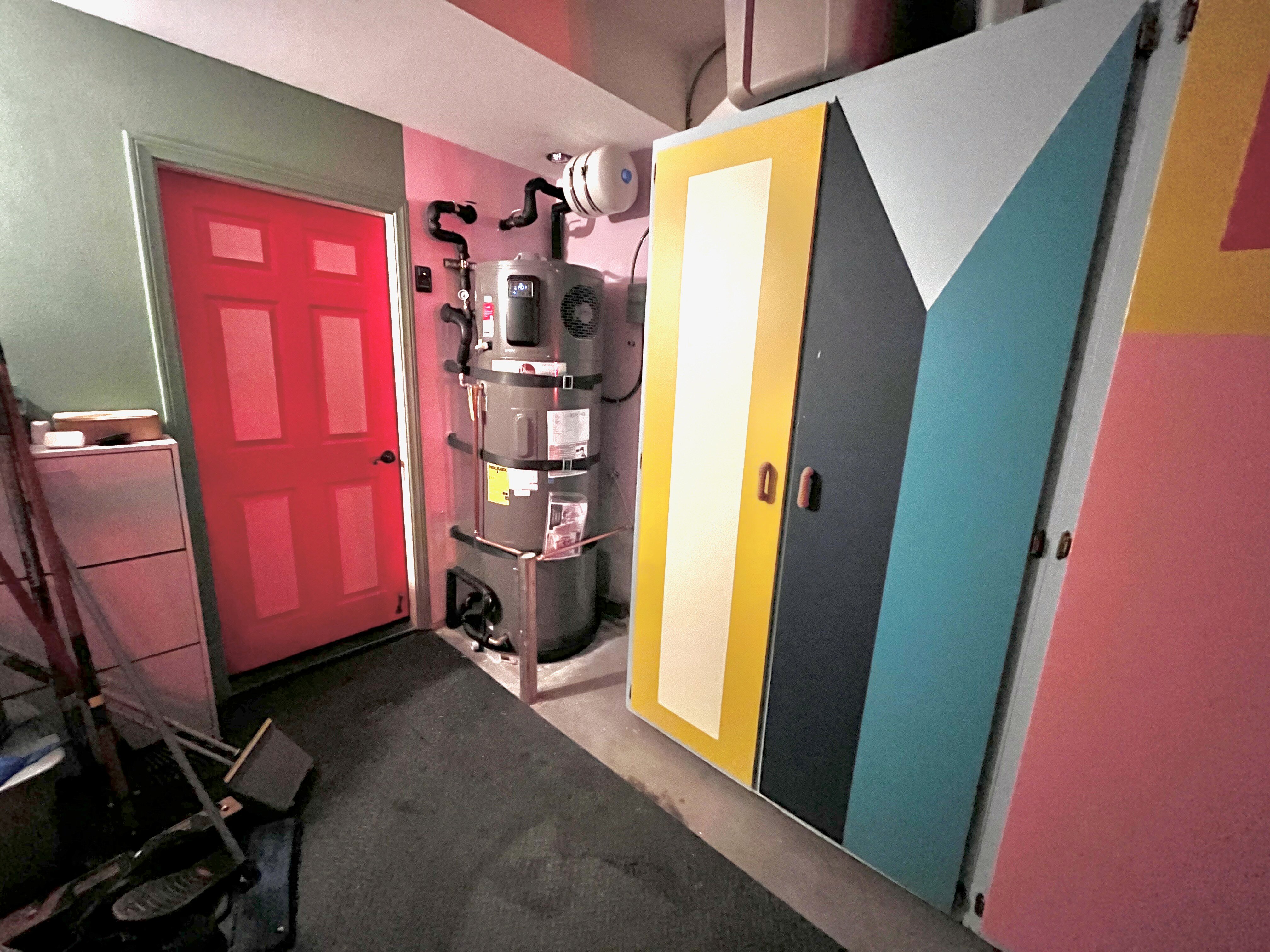The Complete Guide to Heat Pump Water Heaters

Updated November 2024
Have you ever considered how much energy it takes to heat water in your home? Water heaters account for about 20% of a home's total energy consumption, making them a significant factor in both your utility bills and environmental impact.
If you're looking to save money and reduce your carbon emissions, it's time to consider a heat pump water heater (HPWH).
Heat pump water heaters are the most energy-efficient water heaters available. Most HPWHs are at least 200 - 300% more efficient than conventional tanks – and can be up to 400% more efficient!
Heat pump water heaters, also known as hybrid water heaters, have gained popularity in the United States for their exceptional energy efficiency. According to the U.S. Department of Energy, they can be two to three times more efficient than conventional water heaters.
This efficiency translates into around $4,000 in savings on utility bills over the lifespan of the appliance. It’s no wonder that heat pump water heaters are so appealing to homeowners looking to upgrade their water heating systems.
Why should you trust us?
Here at QuitCarbon, our expert planners have helped thousands of homeowners evaluate the best heat pump water heater options for their homes.
We provide free ENERGY STAR® certified guidance along with vetted local contractors to upgrade your home with heat pumps, induction cooking, EV chargers, solar, batteries, and more.
QuitCarbon has won prizes from the US Department of Energy and we collaborate with the Pacific Northwest National Laboratories and the National Renewable Energy Laboratory (NREL) to improve the accuracy of our content.
Article Contents
- How Do Heat Pump Water Heaters Operate?
- Advantages and Drawbacks of Heat Pump Water Heaters
- Equipment Options for Heat Pump Water Heaters
- Costs and Savings
- Sizing Guide
- Heat Pump Water Heaters vs the Competition
- Installing a Heat Pump Water Heater
- Heat Pump Water Heater FAQs
- Conclusion
How Do Heat Pump Water Heaters Operate?
Heat pump water heaters (HPWHs) operate on a simple yet ingenious principle: they transfer heat rather than generate it. Here's how they work:
- The heat pump extracts warmth from the surrounding air.
- This heat is then transferred to the water in the tank, raising its temperature.
- The process is similar to how a refrigerator works, but in reverse.
Many also include an electric resistance heater as a backup, which is why they're often called hybrid water heaters. This backup ensures you always have hot water, even in less-than-ideal conditions.
For optimal performance, heat pump water heaters should be installed in an area with a year-round temperature range of 40º–90ºF (4.4º–32.2ºC). They also require about 700-1,000 cubic feet of air space around them to function efficiently.
QuitCarbon is proud to be the only ENERGY STAR® partner providing free assistance with heat pump water heaters and other clean energy upgrades.
Advantages of Heat Pump Water Heaters
- Energy efficiency: Heat pump water heaters are the most energy-efficient water heaters available. Many HPWHs are at least 300% more efficient than conventional water heaters, and can be up to 400% more efficient.
- Increased safety: These heaters emit no harmful pollution, making them a safer choice for homes with children and pets. Cleaner air in your home also contributes to a healthier neighborhood.
- Cost savings: The high efficiency translates to lower operating costs. Homeowners can save between $200 and $600 annually by switching to a heat pump water heater. Many utilities and government programs offer substantial rebates and tax credits for HPWH installations, making them even more cost-effective.
- Environmental friendliness: Heat pump water heaters emit 2-4 times fewer greenhouse gases than conventional tanks.
- Longer warranties: Heat pump water heaters often come with longer warranty periods compared to standard electric models.
Potential Drawbacks
- Higher upfront cost: The initial investment for a heat pump water heater is typically higher than that of conventional electric or gas models. However, when considering rebates and partnering with the right provider, the total cost of ownership often becomes lower. The operational costs of a hybrid heat pump water heater are lower than traditional water heating systems.
- Space requirements: HPWHs need more space and specific placement considerations compared to traditional water heaters.
- Ambient noise: Some users report a slight humming sound during operation, similar to a modern dishwasher. However, if the HPWH is installed in an appropriate location, this noise should not pose a problem.
ENERGY STAR® notes: "Today’s heat pump technology is far more efficient than previous generations. A low soft humming sound is normal for a heat pump water heater — similar to the sound you hear when a refrigerator turns on."
Types of Heat Pump Water Heaters: Equipment Options
This video covers some exciting new advances in HPWH technology for 2024:
There are two most common types of heat pump water heaters:
- 120 Volt heat pumps that can be plugged into a standard household outlet, making them easier and less expensive to install, and avoiding special wiring or electrical panel upgrades.
- 240 Volt units that require a dedicated 240V circuit and wiring and may need electrical panel upgrades.
Note: All heat pump water heaters have a storage tank.
Many people believe that tankless or "instant" water heaters are more environmentally friendly, but we strongly recommend against tankless units for environmental, efficiency, and cost reasons.
Here are some of the tradeoffs to consider between a 120V and 240V heat pump water heater.
Performance and Capacity
120V models:
- Lower heating capacity and slower recovery times
- Better suited for smaller households with lower hot water demand
- May struggle to keep up during periods of high usage
240V models:
- Higher heating capacity and faster recovery times
- Can handle higher hot water demand
- Better performance in colder climates
Efficiency and Features
- Both 120V and 240V heat pump water heaters are highly efficient compared to traditional electric resistance water heaters
- 240V models often have backup electric resistance elements for faster heating when needed
- Some 120V models lack backup heating elements, relying solely on the heat pump
Cost Considerations
- 120V models may have lower upfront costs due to simpler installation
- 240V models can be more expensive initially but may offer better long-term performance for larger households
Beyond these main options, there are also "split" heat pump water heaters that work well in smaller spaces. The most popular of these is called the Sanden SANCO2 unit, shown below.

Here's a summary of this unit:
- Outdoor heat pump unit that connects via refrigerant lines with a stainless steel storage tank (typically placed indoors, and available in 43 gallon or 83 gallon sizes)
- Uses CO2 (R744) as the refrigerant, which is more environmentally friendly than traditional refrigerants
Costs and Savings
The cost of a heat pump water heater (HPWH) consists of upfront expenses and annual operating costs. While the initial investment may be higher, the long-term savings in operating expenses should be taken into account when considering an HPWH purchase.
Upfront Cost
- Unit cost: The price of a heat pump water heater ranges from $1,900 for a 50-gallon tank to $2,800 for an 80-gallon tank. The cost is influenced by tank size and product quality. Smaller tanks cost less.
- Installation labor: The installation of a hybrid heat pump water heater typically requires 6-8 hours of a plumber's time. Nationally, plumbers typically charge between $45 and $150 per hour; in California, the rates are usually between $75 and $200 per hour.
- Electrician labor: If replacing a conventional electric tank, the existing electrical setup may be compatible. However, replacing a gas heater may necessitate an electrician to install a 30A 240-volt circuit, costing around $1,000 or more, excluding any drywall repair expenses. New, 120-volt models are appropriate for many situations and can plug into an existing outlet, saving you the cost of an electrician.
- Supplies and tools: Additional supplies such as a Thermostatic Mixing Valve (TMV) and a Thermal Expansion Tank (TET) may be recommended for optimal performance and safety. While these increase the overall cost, the TET is required by code – even for new gas tank heaters – and the TMV enhances the efficiency and safety of the heat pump water heater.
- Disposal cost: No extra cost is incurred as the old water heater can be recycled.
On average, the total cost of installing a heat pump water heater ranges from $4,000 to $8,000. However, with available rebates and incentives, many customers end up paying significantly less upfront. Considering the lower operating costs, an HPWH often proves to be the most financially sound and sustainable choice when replacing a water heater.
Annual Operating Costs
The U.S. Department of Energy estimates that the average heat pump water recommended by QuitCarbon heater costs less than $200 per year to operate. This is significantly lower than the $400-$800 annual cost for conventional gas and electric tank water heaters.
Several factors affect operating costs, including the following.
- Energy factor (efficiency rating): The EF represents the amount of electricity required by the heat pump water heater to heat your water. Most heat pumps have an EF of 2, which is 2-3 times more efficient than conventional tanks.
- Cost of energy: The price of electricity varies depending on the location. Electricity is typically cheaper in Southern states and more expensive on the coasts, but your prices may vary.
- Energy consumption: According to Carbon Switch, a typical 50 gallon heat pump water heater uses about 2.5 kWh/day (912.5 kWh/year), compared to a standard electric 50 gallon water heater, which uses uses about 10 kWh/day (3,650 kWh/year).
Rebates and Incentives
Various rebates and incentives can significantly reduce the upfront cost of a heat pump water heater:
- Federal Tax Credit: Up to $2,000 or 30% of project costs.
- State and Local Rebates: Vary by location, but can range from $600 to $3,000.
- Utility Company Incentives: Many offer additional rebates for energy-efficient upgrades.
Check your QuitCarbon Insights for all the rebates and incentives that apply to you, your home, and your appliances - plus advice on timing (new rebates may be coming soon, others may be expiring). QuitCarbon is always happy to help you navigate rebate complexity and get the most money back!
Sizing Guide
When choosing the right heat pump water heater for your home, it's important to consider the brand, size, and specific hot water usage requirements. Here are some factors to keep in mind:
The most common heat pump water heater sizes are 50 gallons, 65 gallons, and 80 gallons. The following sizes work best based on the number of family members:
- 50 gallons: Suitable for 1-2 people who don't use much hot water
- 65 gallons: Recommended for families
- 80 gallons: Suitable for families of 5 or more
However, it's essential to consider your specific hot water usage patterns. If you frequently use large amounts of hot water, such as for big baths or when hosting guests, it might be beneficial to size up. This may come with a higher cost upfront but can provide peace of mind.
We also recommend using a Thermostatic Mixing Valve (TMV). This valve allows you to store more hot water than you use since it mixes hot water from the tank with enough cold water to achieve the desired temperature. This feature can reduce hot water consumption by approximately 15% for each shower, dishwasher, or other hot water usage.
Other Factors
First hour rating: Evaluate the "first hour rating" of each HPWH model you are considering. This rating indicates the amount of hot water the unit can provide within the first hour before the tank needs to refill and reheat incoming water.
Estimate maximum hot water usage: Determine the maximum hot water usage you and your family may have within a given hour. Calculate the flow rate of all your hot water end uses, such as showers, faucets, dishwashers, etc. Add up the flow rates for activities that may occur simultaneously.
Larger tanks come with higher costs, so you can also consider reducing hot water usage. That includes running the dishwasher at night and showering in the morning, or shortening shower durations to potentially require a smaller tank.
Heat Pump Water Heaters vs Gas, Electric, and Tankless
When comparing heat pump water heaters to other options on the market, here are some key considerations:
|
Feature |
Heat Pump Water Heaters (HPWHs) |
Electric Water Heaters |
Gas Water Heaters |
Tankless Water Heaters |
|
Operating Costs |
Much lower operating costs; saves households $300-400 per year |
Higher operating costs due to lower energy efficiency |
Variable, depending on gas prices; less efficient over time |
Generally lower than conventional heaters but can vary depending on usage patterns |
|
Warranty |
Often comes with longer warranties |
Typically shorter warranties compared to HPWHs |
Varies, but often shorter than HPWHs |
Warranties can be extensive, particularly for premium models |
|
Rebates & Incentives |
Better rebate opportunities, including federal tax credits up to $2,000 |
Limited rebate options |
Fewer rebates available compared to HPWHs |
Some rebates available, though typically less than for HPWHs |
|
Lower Climate Impact |
Emits about 4x fewer emissions than electric models; much lower carbon footprint |
Higher impact due to reliance on electricity, often from non-renewable sources |
Higher carbon emissions due to the use of fossil fuels; less environmentally friendly |
Lower climate impact compared to conventional water heaters, but still higher than HPWHs |
|
Safety and Health |
Eliminates risk of carbon monoxide poisoning as it operates on electricity |
No significant safety concerns related to fuel |
Risk of carbon monoxide poisoning, a major safety concern |
Safer than gas models but requires proper installation to avoid issues like scalding |
|
Immediate Capacity |
Provides ample immediate hot water capacity, suitable for high-demand situations |
Provides consistent capacity but may be less efficient for high-demand situations |
Typically provides consistent capacity, though it depends on the size of the tank |
May struggle with high-demand scenarios unless higher GPM models are installed |
|
Energy Efficiency and Impact |
Highly energy-efficient and environmentally friendly; uses less energy and emits fewer greenhouse gases |
Less energy-efficient; higher energy consumption |
Less energy-efficient; more greenhouse gas emissions due to the combustion of natural gas |
Generally energy-efficient, but climate impact is higher compared to HPWHs due to energy required for instant heating |
Installing a Heat Pump Water Heater
 Timing: When to Install
Timing: When to Install
Heat pump water heaters require both plumbing and electrical work for installation, so don’t wait for an emergency, such as a broken water heater, to make the switch. It’s perfectly fine and even advisable to replace your gas water heater while it’s still going strong. The steel is valuable and easy to recycle. Plus, the climate benefits of upgrading to an electric water heater far outweigh any benefit of using your gas water heater until it wears out. Still not convinced? Check out our article "Isn’t it wasteful to get rid of my functioning gas water heater?"
Placement: Where to Install
 Heat pump water heaters are designed to fit into the space where your current water heater is located. However, keep in mind:
Heat pump water heaters are designed to fit into the space where your current water heater is located. However, keep in mind:
- Noise: The fan may produce some background noise, so avoid installing near bedrooms.
- Space: Ensure adequate airflow around the unit (700-1,000 cubic feet).
- Climate: In colder climates, installation in a heated space may be preferable.
- Drainage: A nearby floor drain is necessary for the condensate produced.
Heat Pump Water Heater FAQs
When can I replace my gas-powered water heater with a more climate-friendly option?
Short answer: anytime!
While gas water heaters will keep polluting for as long as they are operating, efficient heat pump water heaters will start saving energy and reducing pollution on day 1.
As long as you have a regular outlet near where the water heater sits, the swap-out should be easy. There are some space requirements, but generally garages, basements, and even outdoor utility closets (in temperate climates) are great locations!
How do I know if I'm ready to switch to a heat pump water heater?
You will need to make sure you have enough space for a large tank, along with adequate air flow, in the room where you're installing a heat pump water heater. Typically garages and basements work best, although we have had clients install their heat pump water heater in an outdoor closet.
If you're replacing an existing gas water heater, these upgrades are typically very straightforward.
Why is it important to electrify my home?
Electrification is a vital solution to combat climate change. Using fossil fuels inside buildings for cooking, space heating, and water heating is responsible for up to 40% of greenhouse gas emissions. Gas water heaters are the equivalent of having another gas-powered car. We must reduce these emissions to mitigate further climate change. When combined with renewable sources of energy, a fully electrified home can operate with zero emissions. Even if you don't have access to renewables, eliminating gas usage or generally making your home more energy efficient will reduce carbon dioxide emissions. While not everyone can transition their entire home to electricity at once, replacing your water heater, whether now or when it fails, is a significant step toward eliminating a substantial portion of emissions.
Choosing a heat pump water heater is one of the most impactful choices you can make for the environment. If you have to buy another gas water heater, you're locking in another ten years of harmful emissions. This also involves missing out on rebates and the health benefits associated with eliminating gas from your home.
Do I need to switch if I have a tankless water heater?
Although gas-powered tankless water heaters can be more efficient than regular gas tank water heaters, they still rely on fossil fuels, namely natural gas, for water heating.
Not storing a huge amount of water doesn't make a difference if it's still being powered by fossil fuels.
Gas tankless water heaters also release a surprising amount of unburned methane -- a global warming gas that's 80 times worse for the climate than carbon dioxide!
If you want to make a climate-friendly choice for water heating, heat pump water heaters are the way to go.
Are there any tax credits for heat pump water heaters?
Yes, under the Inflation Reduction Act, the federal government is offering a tax credit of 30% of your project cost up to $2,000. This counts for any ENERGY STAR qualifying heat pump water heater.
QuitCarbon provides free ENERGY STAR® certified guidance that helps you maximize your tax credits, rebates, and cost savings from heat pump water heaters.
How does transitioning to electric water heating affect my energy bills?
Once you switch to a heat pump water heater, you will consume approximately half the energy required to heat your water compared to using gas. If you are switching from a traditional electric system, you could save $300-$400 per year through more efficient water heating.
While gas is less expensive than traditional electric, heat pump water heaters are still less expensive because of their increased efficiency. You can consider it an investment for the sake of climate and health benefits. Furthermore, if you have solar panels on your roof, you'll experience even greater energy cost savings.
Does using electricity to heat water harm the climate as much as using gas?
No! Natural gas is a fossil fuel that contributes entirely to emissions causing climate change. On the other hand, your electricity can come from renewable sources like solar energy generated by your rooftop panels or renewable energy providers. That's the ideal scenario.
In addition, using heat pump water heaters is more than 2-3 times more efficient than burning gas or using traditional electric water heaters. Even if you were burning fossil fuels to produce the energy, you still need much less energy if you switched to a heat pump water heater, which would help the planet.
How does QuitCarbon help homeowners?
QuitCarbon aids in determining the age of your gas water heater, and the requirements for replacement, and offers recommendations for verified equipment and contractors.
We assess the necessary preparatory tasks for a successful replacement at your preferred time and ensure that you take advantage of all available rebates.
Conclusion
Heat pump water heaters represent a significant advancement in home water heating technology. While the upfront costs may be higher, the long-term energy savings, reduced carbon emissions, and available incentives make them an attractive option for many homeowners.
For personalized advice on selecting and installing a heat pump water heater, as well as navigating rebates and incentives, contact QuitCarbon. We can connect you with trusted contractors to ensure a smooth installation process.
By choosing a heat pump water heater, you're not just saving money – you're taking a significant step towards a more comfortable and energy-efficient home.





